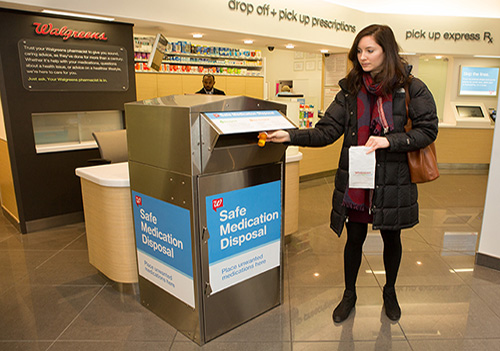
Dr. Jonah Stulberg, assistant professor of surgery at Northwestern Memorial Hospital in Chicago, consults with patient Megan McMenamin as she places unused medication inside a drug retrieval kiosk in the medical center’s surgical clinic. ©Laura Brown/Northwestern Medicine. All Rights Reserved.
April 16, 2018
By JOSHUA BROCKMAN
The last time I recycled a printer cartridge, I marveled at how simple it was. All I had to do was place the old cartridge inside the new box, affix the enclosed pre-paid label, and drop it off for delivery to the manufacturer.

Walgreens has installed 600 medication disposal kiosks in 45 states including this one in a pharmacy in Washington, D.C. The pharmacy giant plans to expand the program to an additional 900 locations with funding from pharmaceutical and health care companies. ©Walgreens. All Rights Reserved.
What’s standing in the way of making it this easy for consumers and patients to dispose of prescription medications? This was the starting point for my Undark Magazine feature on why so few pharmacies and hospitals have installed drug take-back kiosks to help stem the opioid crisis.
Why can’t someone walk into the pharmacy where they picked up their medication and return any unused or unwanted quantities? Similarly, why can’t someone return to the hospital where they had surgery or to their doctor’s office where they received a prescription and drop off meds?
The process could be as easy as recycling a printer cartridge or a plastic bottle. But my reporting revealed a number of obstacles standing in the way of hospitals and pharmacies becoming take-back sites.
Take-back programs help to protect our drinking water by reducing the number of pills that end up getting flushed down the toilet or dumped in the trash. But as it stands, the highest rate of patient use of FDA-recommended disposals methods was just 9 percent. That means opioids continue to linger in medicine cabinets within easy reach of anyone with access. That’s a bitter pill to swallow.
Read my story: Awash in Unused Medications, With No Good Place to Put Them.
